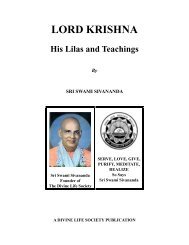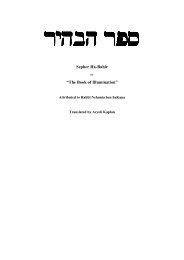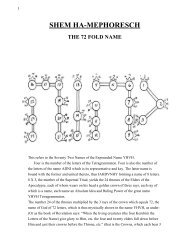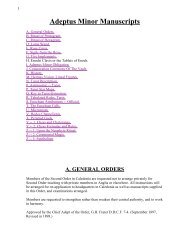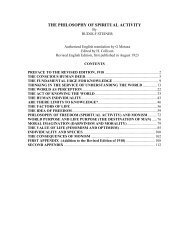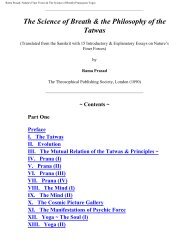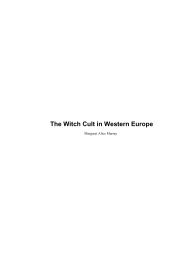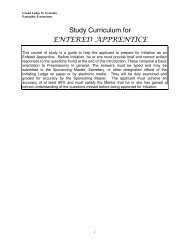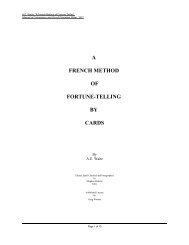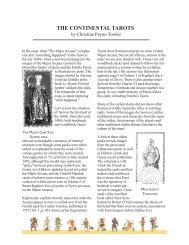Band 2 Anthropogenesis - H.P. Blavatsky
Band 2 Anthropogenesis - H.P. Blavatsky
Band 2 Anthropogenesis - H.P. Blavatsky
Create successful ePaper yourself
Turn your PDF publications into a flip-book with our unique Google optimized e-Paper software.
The author of "New Aspects of Life" describes the Jewish God very correctly from the Kabalistic stand-point as "the Spirit<br />
of the Earth, which had revealed itself to the Jew as Jehovah" (p. 209). "It was that Spirit again who, after the death of<br />
Jesus, assumed his form and personated him as the risen Christ" -- the doctrine of Cerinthius and several Gnostic sects<br />
with slight variation, as one can see. But the author's explanations and deductions are remarkable: "None knew . . . better<br />
than Moses . . . and so well as he how great was the power of those (gods of Egypt) with whose priests he had<br />
contended," he says . . . "the gods of which Jehovah is claimed to be the God" (by the Jews only). "What were these<br />
gods, these Achar of which Jehovah, the Achad, is claimed to be the God . . . by overcoming them?" the author asks; to<br />
which our Occultism answers: "those whom the Church now calls the Fallen Angels and collectively Satan, the Dragon,<br />
overcome, if we have to accept her dictum, by Michael and the Host, that Michael being simply Jehovah himself, one of<br />
the subordinate Spirits at best." Therefore, the author is again right in saying: "The Greeks believed in the existence of . .<br />
. daimons. But . . . they were anticipated by the Hebrews, who held that<br />
------------------------------------------------------------------------<br />
[[Vol. 2, Page]] 509 JEHOVAH, A PERSONATING SPIRIT.<br />
there was a class of personating spirits which they designated demons, 'personators.' Admitting with Jehovah, who<br />
expressly asserts it, the existence of other gods, which were personators of the One God, were these other gods simply a<br />
higher class of personating spirits, which had acquired and exercised greater powers? And is not personation the Key to<br />
the mystery of the Spirit state? But once granting this position, how are we to know that Jehovah was not a personating<br />
Spirit, a Spirit which arrogated to itself that it was, and thus became, the personator of the one unknown and unknowable<br />
God? Nay, how do we know that the Spirit calling itself Jehovah, in arrogating to itself his attributes did not thus cause its<br />
own designation to be imputed to the One who is in reality as nameless as incognizable?" (pp. 144-145.)<br />
Then the author shows "that the Spirit Jehovah is a personator" on its own admission. It acknowledged to Moses "that it<br />
had appeared to the patriarchs as the God Shaddai" . . . . and "the god Helion" . . . . With the same breath it assumed the<br />
name of Jehovah; and it is on the faith of the assertion of this personator that the names El, Eloah, Elohim, and Shaddai,<br />
have been read and interpreted in juxtaposition with Jehovah as "the Lord God Almighty." Then when the name Jehovah<br />
became ineffable . . . . the designation Adonai, "Lord" was substituted for it, and" . . . . it was owing to this substitution that<br />
the 'Lord' passed from the Jewish to the Christian 'Word' and 'World' as a designation of God" (p. 146). And how are we<br />
to know, the author may add, that Jehovah was not many spirits personating even that seemingly one -- Jod or Jod-He?<br />
But if the Christian Church was the first to make the existence of Satan a dogma, it was because, as shown in Isis, the<br />
Devil -- the powerful enemy of God (? ! !) had to become the corner stone of the pillar of the Church. For, as a<br />
Theosophist, M. Jules Baissac, truly observes in his "Satan ou le Diable" (p. 9): "Il fallait eviter de paraitre autoriser le<br />
dogme du double principe en faisant de ce Satan createur une puissance reelle, et pour expliquer le mal originel, on<br />
profere contre Manes l'hypothese d'une permission de l'unique tout Puissant."* The choice and policy were unfortunate,<br />
anyhow. Either the personator of the lower god of Abraham and Jacob ought to have been made entirely distinct from the<br />
mystic "Father" of Jesus, or -- the "Fallen" Angels should have been left unslandered by further fictions.<br />
Every god of the Gentiles is connected with, and closely related to,<br />
[[Footnote(s)]] -------------------------------------------------<br />
* After the polymorphic Pantheism of some Gnostics came the esoteric dualism of Manes, who was accused of<br />
personifying Evil and creating of the Devil a God -- rival of God himself. We do not see that the Christian Church has so<br />
much improved on that exoteric idea of the Manicheans, for she calls God her King of Light, and Satan, the King of<br />
Darkness, to this day.<br />
------------------------------------------------------------------------<br />
[[Vol. 2, Page]] 510 THE SECRET DOCTRINE<br />
Jehovah -- the Elohim; for they are all One Host, whose units differ only in name in the esoteric teachings. Between the<br />
"Obedient" and the "Fallen" Angels there is no difference whatever, except in their respective functions, or rather in the<br />
inertia of some, and the activity of others among those "Dhyan Chohans" or Elohim who were "commissioned to create,"<br />
i.e., to fabricate the manifested world out of the eternal material.<br />
The Kabbalists say that the true name of Satan is that of Jehovah placed upside down, for "Satan is not a black god but<br />
the negation of the white deity," or the light of Truth. God is light and Satan is the necessary darkness or shadow to set it<br />
off, without which pure light would be invisible and incomprehensible.* "For the initiates," says Eliphas Levi, "the devil is<br />
not a person but a creative Force, for Good as for Evil." They (the Initiates) represented this Force, which presides at<br />
physical generation, under the mysterious form of God Pan -- or Nature: whence the horns and hoofs of that mythical and<br />
symbolic figure, as also the Christian "goat of the Witches' Sabbath." With regard to this too, Christians have imprudently<br />
forgotten that the goat was also the victim selected for the atonement of all the sins of Israel, that the scape-goat was<br />
indeed the sacrificial martyr, the symbol of the greatest mystery on earth -- the Fall into generation. Only the Jews have<br />
long forgotten the real meaning of their (to the non-initiated) ridiculous hero, selected from the drama of life in the great<br />
mysteries enacted by them in the desert; and the Christians never knew it.<br />
Eliphas Levi seeks to explain the dogma of his Church by paradoxes and metaphors, but succeeds very poorly in the face<br />
of the many volumes written by pious Roman Catholic demonologists under the approbation and auspices of Rome, in<br />
this nineteenth century of ours. For the true Roman Catholic, the devil or Satan is a reality; the drama enacted in the<br />
sidereal light according to the seer of Patmos -- who desired, perhaps, to improve upon the narrative in the "Book of<br />
Enoch" -- is as real, and as historical a fact as any other allegory and symbolical event in the Bible. But the Initiates give<br />
an explanation<br />
[[Footnote(s)]] -------------------------------------------------<br />
* To quote in this relation Mr. Laing in his admirable work "Modern Science and Modern Thought" (p. 222, 3rd Ed.): "From<br />
this dilemma (existence of evil in the world) there is no escape, unless we give up altogether the idea of an



